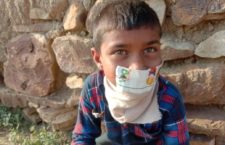“There have been many ‘devis’ in this area. Phoolan Devi fought against her oppressors and achieved deliverance. Laxmibai of Jhansi had nobody with her, but she fought for the country. There were so many of them in this region. For every four ‘devtas’ there’s one devi here.”
Ram Lali, popularly known as ‘Patha ki sherni’, ‘Patha’ being the term for the rugged, mountainous terrains of the Chambal badlands of Bundelkhand this side of Uttar Pradesh, the country’s most populous state, is clear in her description of women in the Bundelkhand region. In her village, you could ask anyone in the area for Ram Lali’s house and be directed to it effortlessly. On the door of her home in Harijanpur village in Chitrakoot district of Uttar Pradesh, the legend is writ large – Tigress of Patha. She is known as ‘rifle woman’.
The rifle is a case in point.
Post the gang rape of Jyoti Singh, popularly known as Nirbhaya, in 2012 in New Delhi, a lightweight revolver ‘Nirbheek’ was designed for women. The revolver is either too unaffordable at over Rs.1 lakh, for women to purchase for their own safety or women have just not heard of it. Nirbheek, meaning fearless, has been a failure, according to women’s rights activists. According to a 2017 follow-up report, the revolver even saw more male buyers than women. Also, is arming women a responsible way to ensure their safety? A valid question in the context of protectionist policies and strategies that are often implemented by the state in response to incidents of violence against women.
Ram Lali, arguably the only woman in the district with a licensed gun, is unusual to say the least, in this context. And yet in Harijanpur, the image of her walking around fearlessly, her heavy rifle on her shoulder, is a familiar one in the densely forested areas where she lives.
Ram Lali’s story fits the same approach of arming women for their own protection. The incident that led to this, made Ram Lali famous overnight. Arming Patha ki sherni and valorising her does nothing to change the actual status of women in a state that topped the list of crimes against women in 2017, according to the National Crime Records Bureau (NCRB) report that was released in October 2019. But what the episode did give Ram Lali was a sense of confidence in her own abilities to address injustice and violence, turning her into a role model for women around her.
Khabar Lahariya talked to Ram Lali about her journey from being a working woman from the Dalit community to a rifle-wielding sherni in Chitrakoot’s Harijanpur village. Ram Lali recounts the incident in 2001 that changed her life years ago and made her famous in the region. That was a time when Dadua, the famous gang leader and dacoit was active in the region bordering Uttar Pradesh and Madhya Pradesh. Ram Lali took on Dadua’s gang, something that was unheard of in the region. She’s fearless and firm, about her stand against the dacoits and against anyone who oppresses women.
“The dacoits abducted the son of a bank manager in Satna. They kept him in the forest here but the boy managed to escape in 6-7 days and came to my house. He called me ‘mummy’ and asked me for help. I told the villagers that we have to save this boy, he was like my own child. Everyone supported me. As soon as the dacoits heard this, they surrounded our village. There were 6-7 gun-wielding men outside my house. My own daughters and family members were inside the house. I told the dacoits to ‘come inside and take the boy if they wanted. I had all my weapons ready- a sickle, an axe and a large chopping knife. It was my duty to help the boy and I’d do anything to save him. The dacoits threatened me with dire consequences but didn’t come inside. They went back without the boy.”
This was the proverbial turning point in Ram Lali’s life. The dacoits abducted her husband after this incident, but Ram Lali did not give up. She put pressure on the police to rescue her husband. Even after this the dacoits continued to threaten this lone woman who had challenged their authority in the area. The district administration provided her with security. One evening when the dacoits attacked her village, there was gunfire for a long time and finally the dacoits fleed, leaving their rifle behind. Ram Lali picked up that rifle and asked the police to let her have it for her own security. She was felicitated for her bravery by the governor of Uttar Pradesh on International Women’s Day and was given the ‘swashakti shreshtha’ award. The District Magistrate gave her a licenced rifle for her protection. The district authorities also pledged to protect Ram Lali. Once Dadua was killed in a police encounter in 2007, the threat to Ram Lali’s life came to an end. There are now eight licenced rifles with her family members and Ram Lali claims to be the leader, always in front and always in charge.
Ram Lali tells us she does not fear anything today, not even death. “Jeeyenge toh dekhenge, mar jaayenge, toh chale jaayenge. (If you die, you die, it’s bound to happen someday).” Her sense of achievement comes from having fought the oppressors, the ‘jallad’ (tyrant) and saving a child’s life. “We didn’t think of the child’s caste, he was like our own child.” A feisty, middle aged Ram Lali feels the incident has empowered other women around her. They’re now ready to fight, even against the police that may sometimes be unfair towards them.
And while her caste too alludes to the Phoolan Devi story – they’re both Dalit women – Ram Lali is not interested in tales of glory and grandeur. It is about survival, she maintains. “We live in a world where we know nobody’s there to help us, to elevate our sufferings here as poor people in villages. We take care of our own.”

